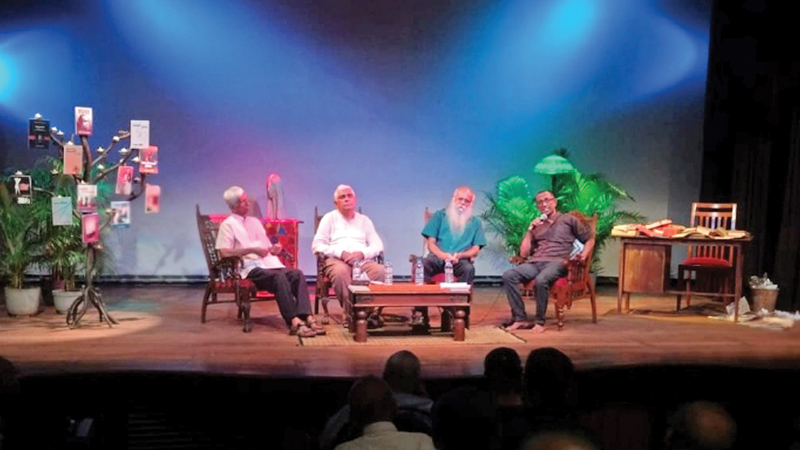The last time I was at the Punchi Theatre, I was serious, subdued and to be honest, anticipating an hour of boredom. But as usual, the Punchi theatre did not let me down. On that very stage, where I had listened to thundering drum beats signifying the advent of the warrior king Ravana, laughed my sides out at the antiques of the Dictator and sobbed unashamedly over the tragic life of the Nattukkari, there resided a venerable bhikkhu, calm and serene in demeanour, who nevertheless, spoke directly to the innermost recesses of my heart, opening the path to a more practical, more do-able form of mindfulness unknown to most other religious advocates.
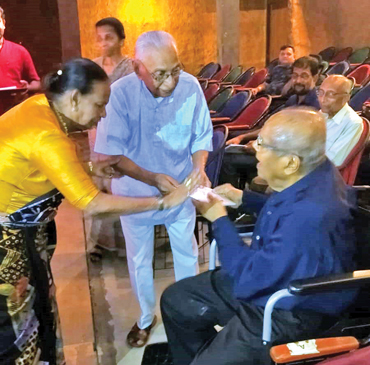
Dr. Gunadasa Amarasekara receiving the first copy of the book
Several days ago, when I was yet again at the Punchi theatre, the words of the Ven. bhikkhu came back to me, amplified as if to make sure I heard them above the familiar voices around me, raised in greeting, hugging; laughing; “the most precious gift you can give those you love is your time.” This single line played and replayed in my mind as I watched professors who had reached the zenith of their careers in the international literary arena; namely Professor D.C.R.A Goonetilleke, senior academics, acclaimed writers, poets, playwrights, journalists, newspaper editors of equally reputed talent as well as family members and close friends step into the cozy warmth of the lounge of the Punchi theatre braving heavy rains, sailing across gushing water ways, blustering winds and bone-shattering cold. Here was the sequel to the venerable bhikkhu’s sermon. Knowingly or unknowingly, we were enacting the lines we had heard the last time we were at the Punchi Theatre; we were all offering the most precious gifts we had; our time, and our love to one of the most precious artistes in our midst; Namel Weeramuni.
Dramatic atmosphere
 Inside the theatre, welcoming us all into the familiar, dramatic atmosphere of breathless anticipation, Malini Weeramuni had aptly set the stage for the ensuing discussion on her husband’s latest collection of short stories; “Bharyavagen Liyamanak” (A Letter from my Wife). On one side was the elegant profile of the ‘wife’ carved in wood and momentarily lifeless. In the far corner was the desk of the ‘husband’ scattered with books, files, newspapers – a familiar sight, no doubt, to all the writers and academics seated in the audience. In the centre of the stage were four armchairs and a coffee table lit by the soft glow of a lampshade resembling a cozy living room awaiting the arrival of guests on a rainy evening.
Inside the theatre, welcoming us all into the familiar, dramatic atmosphere of breathless anticipation, Malini Weeramuni had aptly set the stage for the ensuing discussion on her husband’s latest collection of short stories; “Bharyavagen Liyamanak” (A Letter from my Wife). On one side was the elegant profile of the ‘wife’ carved in wood and momentarily lifeless. In the far corner was the desk of the ‘husband’ scattered with books, files, newspapers – a familiar sight, no doubt, to all the writers and academics seated in the audience. In the centre of the stage were four armchairs and a coffee table lit by the soft glow of a lampshade resembling a cozy living room awaiting the arrival of guests on a rainy evening.
And so, they came, Sulochana Wickramasinghe, Daya Dissanayake, Prof. Praneeth Abeysundara and Tilakarathna Kuruwita Bandara to take their seats, make themselves comfortable, and have a conversation among themselves and the audience where everyone knew everyone else. If ever there was an avant-garde book launch, this was it.
As I listened to the discussion, my eyes taking in the unique, rugged, bumpy walls of the Punchi theatre, the calm intent look on Namel Weeramuni’s face, the glint of love that lit up Malini Weeranumi’s eyes, it dawned on me that it is at the worst of times that heroes are born. A cruel civil war, a horrendous pandemic and an eternal economic depression have seemingly given birth to these two heroes who resonate compassion, resilience, humility and heroics. As the four guests on the stage unanimously emphasized, Namel Weeramuni, Malini Weeramuni and their dream theatre are three such heroes who have emerged from the catastrophic events of our times.
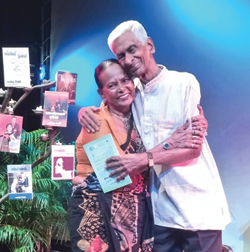
Thilakarathna Kuruwita Bandara receiving a book from Malini Weeramuni
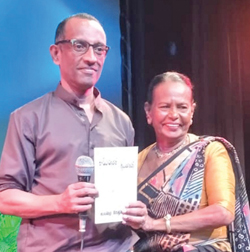
Sulochana Wickramasinghe receiving a book from Malini Weeramuni
While Sulochana gave a chronological description of Namel Weeramuni’s past achievements both with pen and without, on stage and off stage, Daya Dissanayake emphasized one other characteristic other than heroism in the poet, writer, dramatist – his unfailing ability to remain as young at heart as though he was still a young undergraduate at the University of Peradeniya. Commenting on the elusive structure of his short stories, Dissanayake commended Weeramuni for liberating the art of writing from its labels by intermingling two or three genres in one piece of creative work. Prof. Praneeth Abaysundara focused on Weeramuni’s language in ‘Bharayavagen Liyumak’ highlighting the southern dialect, an intangible feature of our culture which needs to be preserved in much the same way we preserve our tangible artifacts. Prof. Abeysundara also complimented Dr. Gunadasa Amarasekera who was presented with the first copy of the book to thunderous applause, for continuing to keep the torches burning bright to preserve one’s mother tongue in an increasingly hostile environment where native languages are fast becoming extinct.
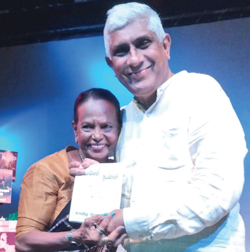
Prof. Praneeth Abeysundara receiving a book from Malini Weeramuni
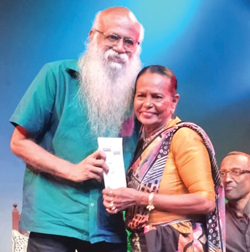
Daya Dissanayke receiving a book from Malini Weeramuni
The lifeless wood figurine of the ‘wife’ on the stage came alive as Tilakarathna Kuruwita Bandara examined the pivotal story in the collection of stories launched that day, the “Letter from My Wife.” As with all good writing, Kuruwita Bandara pointed out that in this story which begins with a letter sent by a woman to her husband twenty-eight years after she had last contacted him, it is not possible to make a clear identification of who is in the wrong and who is in the right.
As he discussed each story in the book, Kuruwita Bandara spiced his discussion with references to his friendship with the Weeramunis, recollecting how he had seen all of Namel Weeramuni’s plays from the first time Weeramuni acted on stage to the last play to date that he directed and premiered at the Punchi theatre – Ravana Seetabilashaya. He recollected reading Namel’s first collection of short stories when it was first published, kissing the pages as he read, for books published by Saman Publishers back then carried a certain attractive fragrance.
Great feats
Meanwhile, long standing fan of the Weeramunis and a stanch connoisseur of the arts, Pabath Manohar writing on the back cover of the newly launched book traces the long journey of the legendary artist spanning more than six decades that began with a short story written in 1959 titled “Pathola Massa.” To date, Weeramuni has written 22 drama scripts among which “Madya Vediyakuge Asipatha and Nattukkari remain as two of his favorites. Unarguably, the greatest of his great feats is the translation of Prof. Ediriweera Sarachchandra’s “Sinhabahu” into English.
It is a well-known fact that due to elements beyond his control the environment in which Weeramuni had hoped to nourish Sri Lankan arts at the Punchi theatre had failed to go the way he or anyone else expected, but neither he nor Malini Weeramuni are wallowing in what-ifs. In January, long before he heard the encouraging hosannas given to him at the launch of his latest book, Namel Weeramuni had begun to draft another script for another new theater production. Evidently, amidst all the hardships, they are determined to continue, unfailingly confident about the decision they made in building the Punchi theatre. “I am disappointed because our country and our society are not going the way I wanted,” Namel Weeramuni once told me. “But looking back, I wouldn’t change any of the decisions I took in my life for anything.”
Of course. As we all agreed that evening, anything is possible at the Punchi Theatre because Namel Weeramuni has the sun on his side – he has Malini Weeramuni beside him.
May they both know nothing but joy in all their future endeavours at the Punchi theatre. “Merin sa haryalye alasse!”







